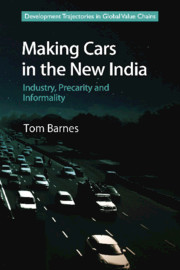Book contents
- Frontmatter
- Dedication
- Contents
- Tables, Figures and Maps
- Acknowledgments
- Abbreviations
- 1 The Limits of Industrialisation
- 2 The Auto Industry in India Today
- 3 Auto Manufacturing and the Evolution of Industrial Policy
- 4 The Transformation of Labour Relations
- 5 Auto Workers in India's National Capital Region
- 6 Work and Life at the Bottom of the Auto Supply Chain
- 7 Driving Down the ‘Low Road’?
- Appendix
- Bibliography
- Index
Appendix
Published online by Cambridge University Press: 23 October 2018
- Frontmatter
- Dedication
- Contents
- Tables, Figures and Maps
- Acknowledgments
- Abbreviations
- 1 The Limits of Industrialisation
- 2 The Auto Industry in India Today
- 3 Auto Manufacturing and the Evolution of Industrial Policy
- 4 The Transformation of Labour Relations
- 5 Auto Workers in India's National Capital Region
- 6 Work and Life at the Bottom of the Auto Supply Chain
- 7 Driving Down the ‘Low Road’?
- Appendix
- Bibliography
- Index
Summary
In total, 157 people were interviewed for the study of automotive manufacturing firms located in the National Capital Region (NCR), which is India's largest auto producing area. This includes 106 workers in different tiers of the industry, 21 employers or managers, four labour contractors, as well as 26 other participants, including landowners, trade union officials, government officials, and some workers employed in other sectors or industries.
For OEMs, 12 workers were interviewed, but no employers. The workers were all employed as regular workers or had recently been retrenched. For Tier-1 firms, 47 workers were interviewed. Of this, 13 were contract workers and 34 were regular workers. In addition, it was possible to interview 4 Tier-1 employers: two plant managers, one senior manager, and a senior company executive.
For Tier-2 firms, 14 workers were interviewed, of which 12 were contract workers and 2 were regular workers. Two Tier-2 employers – a senior executive and a plant manager –were also interviewed. For Tier-3 firms, 33 workers and 11 employers were interviewed, including 6 business owners or proprietors, 3 managers and 2 skilled workers in supervisory roles. Four Tier-4 business owners – all own-account workers – were also interviewed.
Four labour contractors were interviewed. No employer, worker or trade union was willing or able to put the author in contact with a labour contractor. In total, 90 labour contracting enterprises were contacted by mail and over 40 enterprises were physically approached at the cluster of offices in Old Gurgaon. Most labour contractors refused to speak about their work. However, 8 labour contractors were prepared to hold discussions and, of these, 4 agreed to participate in formal interviews to document their activities, functions, and relations with workers and employers in the auto industry.
The interviews are listed by tier or group and in chronological order by the date of interview. In order to maintain the anonymity of participants, most names of most of the firms in this study have been coded. A minority of participants were not adversely affected by having their identities revealed and instructed the author to do so. In these cases, the names of participants and their position and affiliations have been recorded.
- Type
- Chapter
- Information
- Making Cars in the New IndiaIndustry, Precarity and Informality, pp. 229 - 232Publisher: Cambridge University PressPrint publication year: 2018

